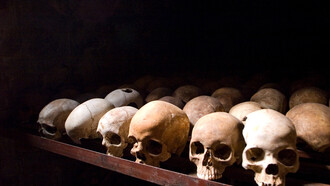The underground metro transportation service of Caracas, the capital city of Venezuela, was inaugurated in 1982. It was commissioned and constructed with the French railway technology of those days and several local companies that dug the main tunnels and stations. The purpose of this construction was to service the more than two million inhabitants of the city which lies in a valley at 800 meters of altitude above sea level, in a seismic region and separated from the coast by a beautiful mountain chain whose main mountain was named Warairarepano by the early Aborigines, and the Avila by later Spaniards.
The construction took several years during the period known as the Democratic Period (1959-1998). When the main central route was finished in 1982, it became a model of behaviour for its users. In the “Metro”, as it is popularly known, a strict pattern of rules of conduct was imposed in order to keep both trains and other installations clean and in good condition. It was forbidden to eat or drink inside the metro, animals were not allowed and heavy loads and any disturbances were strictly controlled. The overall architecture, even in the 90s, was considered to be part of other developed cities of the world, even considered to be superior to Paris, London, or New York’s.
It has been known that if a passenger showed an inadequate behaviour such as reclining feet on the underground walls, a voice on the general speaker would come up and say: “Excuse me, but would the gentleman in the green jacket take your feet off the wall, please take care of your Metro”. Another saying was: “Do not approach the yellow line, it is the limit of your safety”.
The underground was then also expanded to 3 more routes and connected with an above metro bus, an extra service for the price of one ride to areas not reached by the underground.
In the early XXI century, it was possible to see the same civilised behaviour and the expansion of further routes and stations, but the seed of destruction started to grow. The prices of the tickets did not reflect the cost of the service as it was being subsidised by the new Socialist state, partly to help the poorer population as a demagogic way to earn sympathies. This policy of management affected the quality of the service: electric staircases began to fail, the corridors were invaded by rodents, cockroaches, stray dogs, etc., criminality rose, accidents started happening, people were seen carrying items of furniture, eating and drinking were permitted and salaries of the underground personnel was meagre and the cleanliness and general aspect considerably declined.
One of the worst decisions was to replace the French wagons and machine technology with a Spanish version, as by those days the French government was not well seen by the then Venezuelan president Chavez and his team. Moreover, the red wagons both inside and outside were covered with political propaganda of the socialist government, most of them quite untrue and far from reality.
The Metro became overcrowded and insecure, mainly due to the fact that tickets were so much cheaper than normal, even though accidents and deaths were reported due to the high number of people in the stations. After the death of Chavez, the next administration made an even more dramatic bet by giving away free tickets and this ensured the Metro's almost final decline.
But then, around 2018, the regime understood that this service had to be kept at least to a minimum, so they raised the price of the tickets. However, people now prefer to use buses and motorcycle taxis rather than risking their lives on the underground.
I see three possible solutions to recover the Metro of Caracas. First, it should be to completely privatized, sell the whole infrastructure and get the real cost of the service. Second, that a new state administration invests in the recovery of the infrastructure but also maintains an adequate service and pays decent wages to all the workers. Finally, a mixed system, both the official state and private entities taking into account the needs of the citizens and the rateability of the Metro.
Lastly and most importantly, teach the Venezuelans that they can be better people again.















